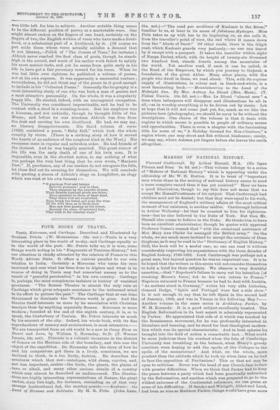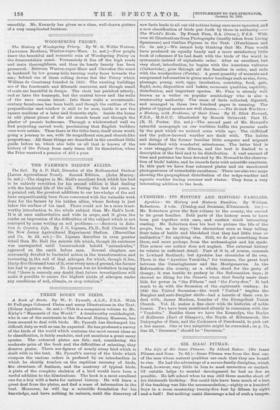MAKERS OF NATIONAL HISTORY.
Viscount Castlereagh. By Arthur Hassell, M.A. (Sir Isaao Pitman and Sons. 3s. Od. net.)—This volume belongs to a series of "Makers of National History" whioh is appearing under the editorship of Mr. W. H. Hutton. It is to treat of "important men whose share in the making of national history seems to need a more complete record than it has yet received." Hero we have a good illustration, though to say this does not mean that we accept Mr. Hassall's estimate of his subject. That Castlereagh had abilities need not be denied; but that they were equal to his work, the management of England's military affairs at the most critical moment of her existence, is another matter. Castlereagh believed in Arthur Wellesley—let that be counted to him for righteous- ness—but he also believed in the Duke of York. But then Mr. Hassell also seems to believe in the Duke. Ho thinks him to have been an excellent administrator, though he quotes with approval Professor Oman's remark that "with the occasional assistance of Mrs. Mary Ann Clarke lie managed the British army." On the whole, we are much more inclined to accept the estimate of Dean Stephens, as it may be read in the" Dictionary of English History." Still, the book will be a useful one'; no one can read it without considerably improving his acquaintance with the three decades of English history, 1793-1823. Lord Castlereagh was perhaps not a great man, but beyond qudstion he was an important one. It is to be hoped that the writers ib this series will not consider themselves to hold a brief for their subjects. We observe a very doubtful assertion,—that "Napoleon's failure to carry out his intention [of crushing Moore's force] led to his own return to France." Napoleon returned to France because he had to deal with Austria. "As matters stood in.Germany," writes his very able historian, General Dodge, "Spain and Portugal wore but a side show." Is it not enough to say that he left Spain in the second half of January, 1809, and was in Vienna in the following May P- Another volume in the same series is Archbishop Parker, by W. M. Kennedy. It is a good subject excellently treated. The English Reformation in its best aspect is admirably represented by Parker. Be appreciated that side of it which was touched by the. Renaissance movement, for he was profoundly interested in literature and learning, and he stood for that theological modera- tion which was its special characteristic. And in both spliereslie. brought into the field of action a remarkable tact. What could be more judicious than his conduct when the fate of Cambridge University was trembling in the balance, when Henry's greedy courtiers were hoping to add the .spoils of. tha Colleges to the spoils of the monasteries.? And what, on the whole, more prudent than the attitude which he took up when later on lie had to face the opposition of Puritanism ? This or that act may be open to criticism. Never was the head of any Church face to face with greater difficulties. When we think that Parker had to keep the peace between a party which had been practically untouched by the Reformation, and another which was prepared to go to the wildest extremes of the Continental. reformers, we can guess at some of his difficulties. If Soaks and Whitgift, Abbot and Laud, had boon as wise as Matthew Parker, things would have gone more
smoothly. Mr. Kennedy has given us a clear, well-drawn picture of a very complicated business.

























































 Previous page
Previous page